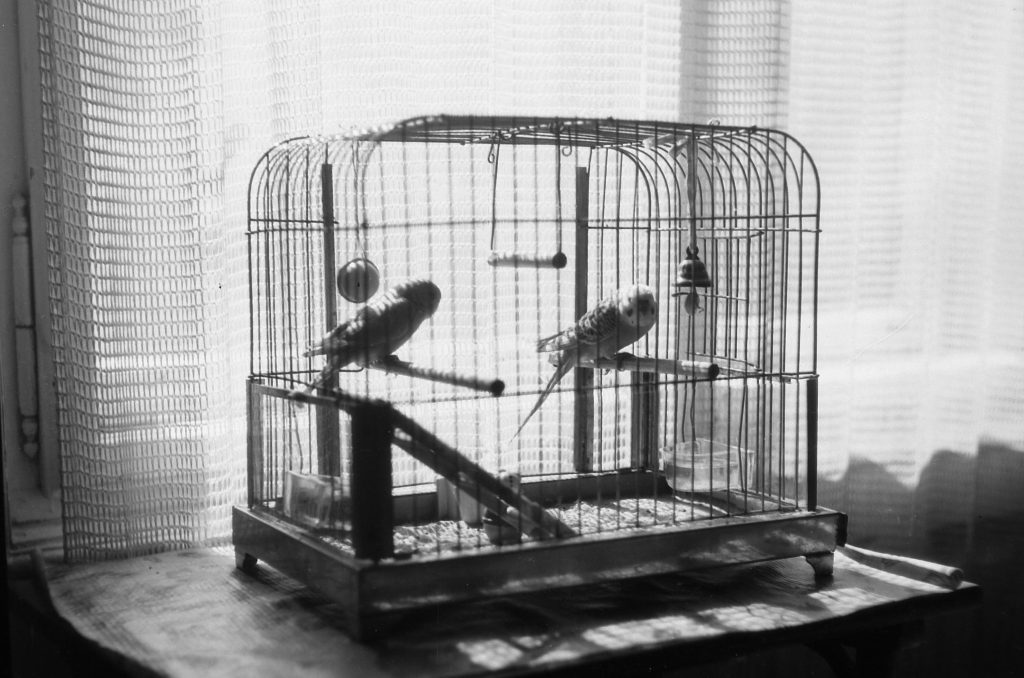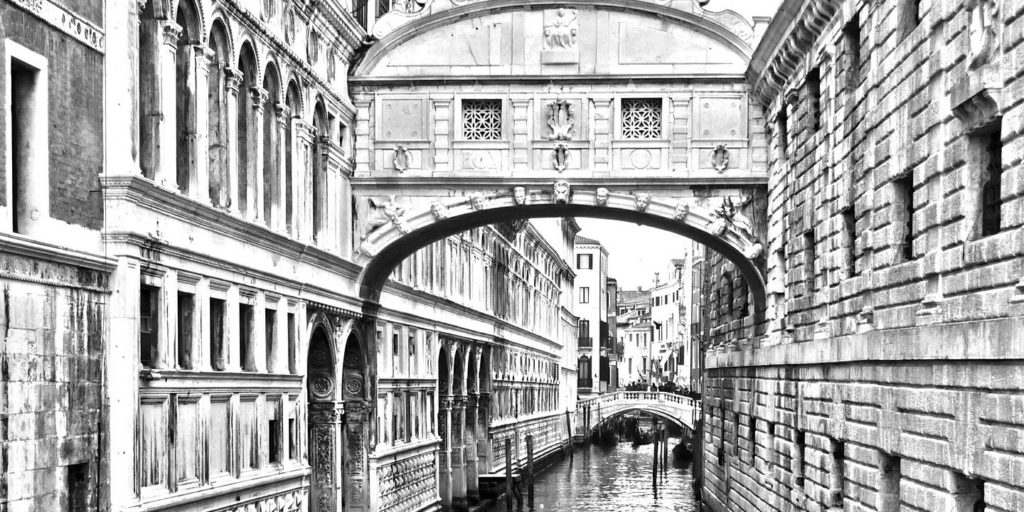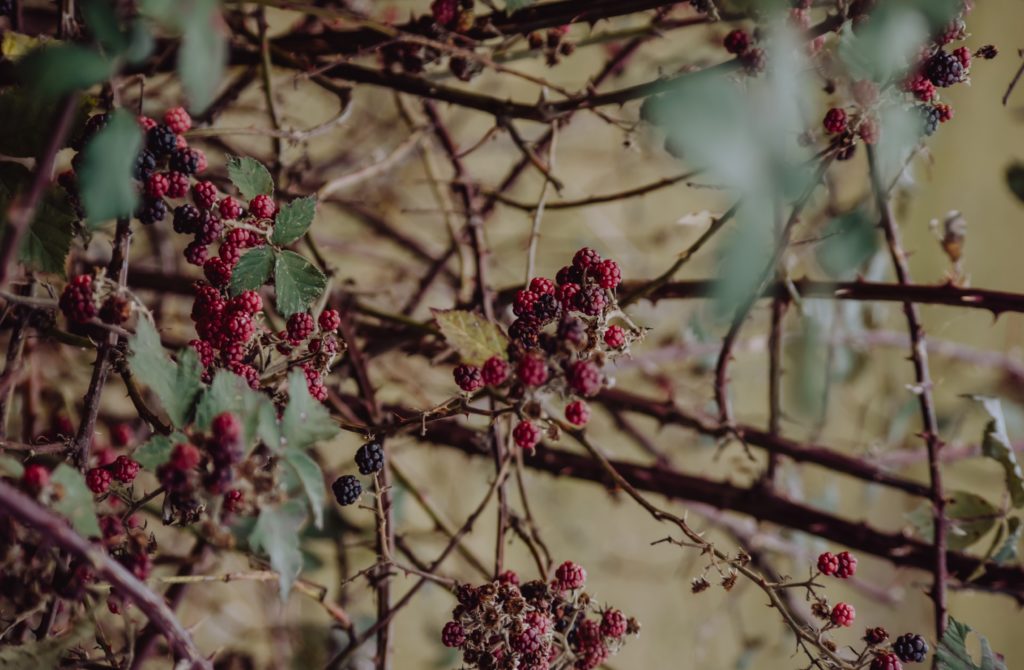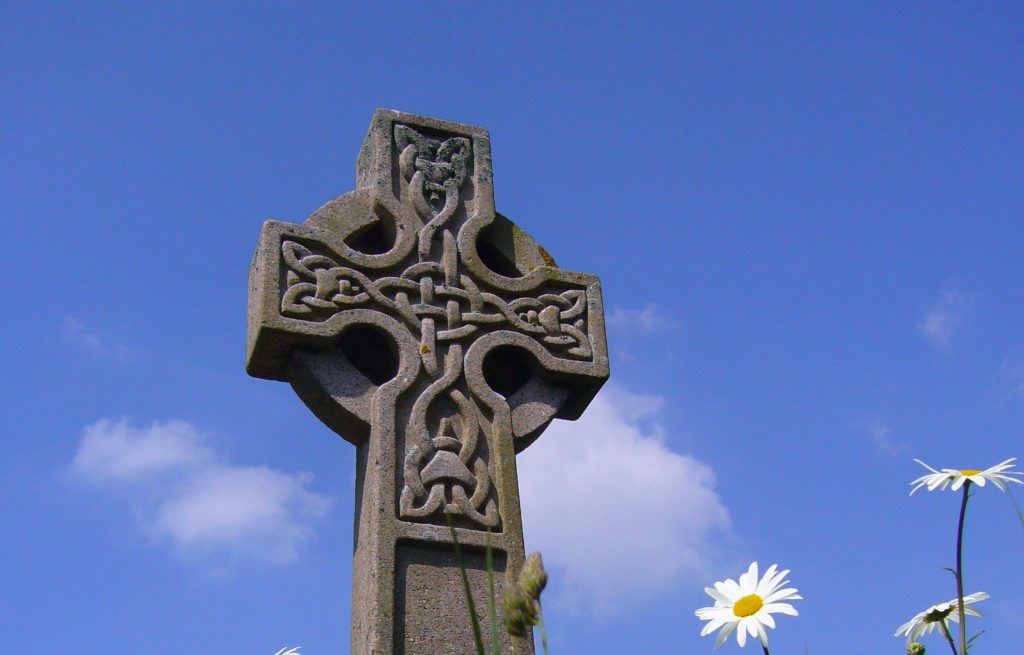Mr Jones lived down the terraced houses at the end of our street. You’d never have known. There wasn’t anything obvious about him. Often he’d be out in his front garden, mowing, or pruning, or painting a window frame. He’d call out Good Afternoon and we’d reply but we never gave him much thought.
In that world, in those four or five streets of our childhood, you could walk up to the end of the road and the River Witham was right there – wide and brown and so flat that the drifting clouds were reflected in it. Straight across the water was the great tower they call The Stump, rising so high it split the sky.
One day – a breathless day at the beginning of summer – Cissy, Helen and I were idling back past The Stump and across the bridge. We’d been at school earlier in the day and still wore our uniforms. In the park little boys had shouted – you got titties, you got knockers, you got bazongers. So we had sat around by the sluice instead, watching children walk out along the top of the gates high above the pleated water.
Now we turned down Irby Street – which was our street – and stopped to stroke Mrs Barber’s cat. We were just outside Mr Jones’ house so he came to speak to us.
Good day at school? Isn’t the weather fine?
Then he said – Perhaps you’d like to come and see my budgerigars?
It was known that his birds occasionally won prizes so we were pleased enough to follow him. Cissy was giggling and Helen and I wished that she wouldn’t. Mr Jones’ garden had standard roses up near the house and every edge was neatly trimmed. At the centre of one of the flowerbeds was a small basin with a stone fairy balancing on one leg. All the houses had gardens like that then and the houses themselves were equally spruce. You would never have thought of paying someone to paint your garage door or wash your windows. You were expected to do it all yourself.
Mr Jones took us up past the spinning-on-one-leg fairy and in through the front door. The telephone table had a neat lace mat on it. A collection of shining copper plates hung on the wall. You couldn’t see how they were fixed. In the kitchen all the surfaces were plastic marble, very clean, although peeling in places. A pelmet above the curtain had a fringe of gold all along the bottom edge.
I think that it was then, as we followed him, that I looked at Mr Jones properly for the first time. He was a small man, neat and delicate as a dancer. His hair was dark and had not thinned. His skin was tanned and his mouth and eyes sagged a little. His hands seemed oddly fragile and he carried them a little to the side of himself, as though they might break.
We stepped out through the back door into a concrete alley that led out to the sheds. In those sheds it was all wire cages on wooden shelves. Some of them were just rectangular, but some had arches or Chinese type roofs. Some had little curtains, very fancy, with laced edges, pulled back, almost like a stage at the theatre. Inside were jewel-coloured birds – lime green, turquoise, yellow. Their backs ran straight into their heads with almost no necks at all. Some of them had stripes of white and black on their wings or at their throats.
Mr Jones asked us if we would like to see one up close. He opened a cage door and a bird jumped onto his hand. This is Ida, Mr Jones said. Cissy leant in close. Ida turned her head to Cissy, twittering, as though telling her information of great importance. All of us leaned forward to speak to the bird, to join in her nodding and chattering conversation. Never had we seen anything so complete and perfect.
After that Mr Jones showed us how to fill the dispensers for the seed and the upside down bottles for the water. He also showed us the millet sprays the birds had for a treat and the grit for their digestion. Then he went to fetch us a jug of squash from the kitchen. That was something we never got at home – and Garibaldi biscuits with a lace doily underneath. We only ate two each although we wanted more. Mr Jones said we could come back another time and get out one of the birds ourselves.
And so it was that we went several more times. All of us crammed into the tight spaces of the sheds, with the smell of seed and bird poo – although Mr Jones kept the birds very clean and showed us how to pull out the trays under the cages, and wash them out, to keep everything fresh. We also wiped the miniature bells, trapezes, mirrors and ropes the birds had to keep themselves amused. We learnt how to get the birds out of their cages, felt their tiny claws gripping our fingers as they bobbed up and down.
And that was how it could have gone on and I don’t know why it didn’t. I think maybe it was Cissy. Anyway, I’d gone with Mr Jones into the end shed to get some more seed. And he said in a perfectly normal manner – maybe you’d like to see something else. Then he put his hand down and undid his flies. He was between me and the door. I couldn’t run, I didn’t want to run. What I saw was something purple and crumpled in a tangle of black hair.
No. I said. No. I got past him to the door. I was glad it was only me that had seen. That way I could just forget. But it didn’t work like that because when he came back into the other shed his flies were not done up. And Cissy soon noticed and kicked me in the ankle. I was horribly embarrassed for her. Didn’t she know it was better to pretend not to see?
But soon there was no chance of pretending because he’d put his hand down there and pulled the purple crumpled thing out further. Helen saw then and I thought she was going to scream. But instead she stepped back suddenly, her mouth cramped shut. None of us had seen anything like that.
Back then, bodies didn’t really exist. You might see them at the swimming pool or on the marsh in the summer but that was all. Inside houses they lived under long night gowns or pyjamas with dressing gowns over the top. Bathroom doors were kept firmly shut. You tried to avoid being seen crossing the landing in your dressing gown. You certainly never went downstairs in your nightclothes.
I said – we have to go now. Thanks very much. Sorry.
Helen was looking at the floor but Cissy was staring right at that thing. Helen and I had to drag her back through the plastic marble kitchen and out of the glazed front door, pulling it shut behind us. Then we all ran fast, breathless, up towards the sluice gates. The sight of the river reflecting ragged silver clouds calmed me. Cissy was laughing, Helen looked as though she might cry.
Filthy old bugger, Cissy said.
I wished she wouldn’t. I didn’t want any of us to say anything about it.
We have to tell someone, Helen said.
No. Absolutely not.
What does it matter? Cissy said. It wasn’t even a proper one. That’s not what a real one looks like. It’s not meant to be all floppy like that. It’s meant to stand up straight. He wouldn’t be able to have children with one like that.
The bronze, innocent evening was tarnished. It was worse than those boys in the park – much. I minded that we probably wouldn’t see Ida or the other budgerigars again, we wouldn’t feel their tiny claws wrapped around our fingers, or stroke their nodding heads. I had liked Mr Jones. Now every time I walked past his house, I would think of that. And if he was in the garden, I wouldn’t know what to do or say. It all seemed so unfair.
∆
When I got home, Mum was baking. Flour was dusted all up her willow arms and the kitchen window was hanging open. When I came in the radio was on and I heard her singing to herself, saw her dance, a quick shuffling step or two, as she moved between table and sink. It embarrassed me that now I’d nearly grown taller than her.
You’re back early, she said. Fallen out with Cissy?
No. No.
I stood by the table, drawing a pattern in the flour with my finger. Mum was moulding currant buns, putting them on a tray. She made her own dresses on a sewing machine, got the patterns out of the Daily Telegraph. Absolutely the latest fashion, she said. But the fabric was all big flowers and she looked silly.
Sit down, love, she said. PE must have been tiring in this heat.
I sat down. I wanted to put my head down on my elbows but I didn’t do it, just kept drawing patterns in the flour. Out the back I could see the terraced garden leading up to the gate and the river bank. I couldn’t see The Stump but the thought of it made me feel stronger.
Maybe you want a glass of milk? Mum took a glass down from the cupboard and poured out milk. Her floury thumb prints were on the side of the glass and I touched them, rubbing the grease around further. I drank the milk down and felt a little better.
So what happened? Mum said.
Oh nothing really.
You girls, she said. You’re getting to that age.
It wasn’t that. It was.
Mum opened the oven door, slid the buns in. A curl fell over her forehead.
You know Mr Jones, don’t you? I said.
Mum looked straight at me then, made a strange gesture with her floury hands.
Oh yes. We all know Mr Jones.
Only.
Oh, she said. Oh. Really. That man.
I stared at the patterns in the flour. I should never have said anything.
Was he? Mum said.
I shut my eyes and screwed them up. Even if I had wanted to tell her, I wouldn’t have known the right words.
Was he getting his private parts out? Was that what he was doing?
Yes. I said. I felt angry with her then. She was as bad as Cissy, saying it like that, in those words. She wasn’t meant to know anything about such things. The other mothers at school were fat and didn’t wear dresses with big flowers and all that. They didn’t dance to music on the radio.
That was it, wasn’t it?
Yes. I mouthed the word without looking up.
Oh, she said. Oh. Then she got a dishcloth and started wiping up the flour. Really I am angry with him, she said. He has been told before. It’s disgusting. And particularly girls of your age. He really should have more consideration. He may have been widowed but that’s no excuse.
I liked going there, I said. I liked the budgerigars.
Course you did, dear. Course you did. But there’s no reason why you can’t go again. There’s no real harm in him. And the fact is – you need to go again. Or the whole matter is just going to hang around like a bad smell.
But what if he?
Well, you’ll just have to tell him. You’ll just have to take it head on. Others have. And I think if you do that, you won’t have any more trouble.
But I.
It’s quite simple, dear. If he behaves like that, if any man behaves like that – then you’ve just got to be quite firm. You’ve got to say – put that away immediately. You should be ashamed of yourself. You’re letting yourself down and everyone else.
∆
Two days later, up on the sluice gate, I told Helen and Cissy what my mother had said. We were leaning on the fence, watching a ten year old boy walking out along the narrow gates, arms stretched wide, placing each foot carefully. Below the water was brown, opaque, smooth as glass.
Cissy said – I don’t care anyway. He’s only an ugly old man. He can wave his limp thingamajig at me as many times as he wants.
Helen said – You can’t say anything. I don’t think your Mum has got it right. You can’t talk to someone about that.
We all looked out at the distant, wavering boy. His sister was at our school and we should have told him to get off the gates but, right at that moment, I don’t think any of us cared if he fell in. The truth was that we all wanted to go to Mr Jones’ again. Cissy said it and we all agreed. It was Ida, we said. And the biscuits.
∆
But after that Mr Jones didn’t ask us in again. We walked up and down the road rather more often than was necessary and sometimes he was there. He’d wave to us from the garden, ask politely about school, but he never went further than that. Cissy said he had a secret girlfriend who had moved in and he didn’t want us to see her.
A month or two went by like that. Maybe it was best not to see him again. But I didn’t like to see the house as I went past. I didn’t know where to look. Of course, I could have taken another route, gone along the riverbank instead, but I didn’t. One day we did go up there and we stood near his back fence and heard the birds cooing.
Then Cissy had to go and say. I bet he’s there now. In one of those sheds with is flies undone and –
Helen put her hands over her ears and I pulled her away down the bank but we could still hear Cissy’s laughter even when we were nearly back as far as the sluice gates again.
∆
Then he did ask us in. It was autumn by then, a few weeks into the new school term. The evening air was heavy and mist-soaked. The street smelt of dead leaves and bonfires. We had all just gone into the sixth form then and wore jackets instead of school jumpers. I had just been picked for special hockey training. So there we were – larking along the street, strangling each other with our school ties – when he suddenly appeared around the side of his garage, rake in hand, and asked us in.
As we stepped into the hall, past the lace mat on the telephone table, I felt my stomach squeeze up. Would I have to say what my mother had told me? I looked at those bronze plates and thought – how do they stay on the wall? I let Cissy and Helen go ahead of me out the back. But then it all went on as though nothing had ever happened. We chopped up apple and grated carrot for the birds. Mr Jones told us Ida had won a prize at a show in Lincoln. Then he poured us lemon squash and put Garibaldi biscuits on a plate. Cissy kept kicking my ankle and giggling. I hated her for it. Why did she have to spoil everything?
I began to think maybe we had imagined it all. Maybe it hadn’t been quite what we thought. But then just as I was carrying the tray into the kitchen, I saw Mr Jones’ hand move. I kept my back turned, made a show of putting the glasses in the sink. I knew that I would have to say it. My mother had told me I would. But I wasn’t going to face him on my own. I needed the others there.
Eventually I heard them come in. Helen drew breath, Cissy giggled. I turned around. He had his hand down there and he was pushing the poor limp thing, like a little frightened animal, towards us. I suddenly felt such pity for him that I didn’t know if I’d be able to speak. Helen put her hands over her eyes and Cissy was suddenly crying. For a brief moment I thought of my mother – her neat feet moving heel and toe, heel and toe – across the kitchen floor. Then I thought – this is quite easy, I can do this.
Mr Jones, I said. The power and anger in my voice frightened me. I sounded as bad as the science teacher at school. Mr Jones, I said again, in that strange booming voice.
I imagined myself stuck there forever, saying his name again and again. I’d forgotten what else I was meant to say. My heart was booming in my ears, my head felt horribly swollen. Three Garibaldi biscuits were still neatly arranged on their paper doily. Mum, mum, please don’t dance. It’s silly. Cissy was moving towards the door. What a coward. As I watched her, the words I rehearsed came back.
Mr Jones. You must put that thing away. You must stop doing that at once. You are letting yourself down and everyone else as well.
Nothing happened. My hands were sticky from the lemon squash. I couldn’t look at Helen or Cissy. The budgerigars in their cages were purring and burbling. The kitchen felt like a cage. The three of us were budgerigars, trapped there forever, our heads nodding endlessly back and forwards.
Do you hear what I’m saying? I said. You do understand?
Although I had imagined this scene many times, my fantasies had only ever stretched as far as the words I would say. I had never considered what might, or might not, happen afterwards. So it came as a surprise to me when Mr Jones cleared his throat, smiled slightly, shrugged and then hurriedly did up his trousers.
Right, I said. Cissy and Helen, please help to clear away. I knew somehow that this was important. We couldn’t just leave. We had to make it all seem pleasant and normal. Helen put the squash away in the cupboard and I finished washing up the glasses. I asked Mr Jones if Ida would be going to another show soon. Mr Jones said that she would, as he put the Garibaldis in a tin.
Thank you, I said. Thanks very much, Mr Jones. We did enjoy seeing the budgerigars. Helen and Cissy mumbled thanks as well and we all walked out of the door, trying to look as normal as possible. I put my chin up high to show I didn’t care. Blood was still burning in my cheeks. The street appeared to have shrunk, everything in it looked ridiculously small and fragile. It was all just so many children’s toys.
In silence we walked up towards the sluice gate but as soon as we were on the flatter ground Cissy turned on me. How could you? You stupid fool? What do you think you sounded like? Then she started to cry again and ran away down the bank.
She’s in love with him, Helen said.
Don’t be so stupid.
No. She is. But what you did was right.
Back then, we never touched. No-one did. But now Helen reached out her hand towards me. We both laughed nervously. Suddenly I felt as tall as the sky, as the tower of The Stump, and big enough to step right across the wide river. I know Helen felt it too. We caught hold of each others’ hands, spun round and round, laughed with our heads back, then collapsed in the grass on the river bank, giggling and squealing, wriggling our legs. The sky was whirling around, the leaves of the trees spinning. As we lay in the grass, Helen’s head was close to mine and we looked at each other deeply for a long time, smiled, laughed again.
∆
After that Cissy never went in to see the budgerigars again but Helen and I went. We never had another problem. I told my mother what I’d done. I told you so, she said. There’s no other way. You’ve got to take a firm line.
Not long after that, everything changed. It wasn’t anything to do with Mr Jones, it was just the sixth form really. You couldn’t just mess around throwing your hat in the school corridor and swapping sweets any more. We lost interest in the budgerigars. They seemed a bit childish and anyway there was too much work to do.
At Christmas Cissy left the High School because she was never going to pass any exams even though she was easily clever enough. Instead she got a job in Oldrids and started going out with Kevin Dean. One night coming back late from hockey practice, I saw her standing at the bus stop with her hair dyed blonde and smoking a cigarette.
No sooner had Cissy gone than Helen went as well because her Dad got a job managing the pie factory in Grimsby. I missed her badly and walked to school alone. Once or twice, during that time, I went along to see Mr Jones. In the spring I helped him plant out some seedlings and he showed me how to use the long-handled secateurs to keep the edges neat. Ida won a prize in a show in Norwich. The leg fell off the spinning fairy and Mr Jones said it would be too expensive to replace.
Then I got a place in the Junior County Hockey. That was a shock. Mr Jones said – Jolly good for you – and so did my Mum. I’d always loved hockey and been good at it but I’d never thought I was as good as that. Soon I had to go to practice every night. The coach said I’d make a good PE teacher and immediately I thought – yes, that’s right, that’s what I’ll do.
Not many got a place at PE College but I did. Helen rang to tell me she had a place at Nottingham University. I was so proud of her. I didn’t see Cissy but I heard she got married to a man out on the marshes. People used to see her at the market, selling fruit and vegetables. I think she also travelled around to peoples’ houses, doing hairdressing.
One Christmas, when I was home from College, Mr Jones invited Mum and me for tea. He had become small by then and hunched. His hands were trembling as he carried the tray and he didn’t even notice that one of the Garibaldi biscuits had slid off the plate and onto the carpet. I picked it up without him seeing while Mum edged the crumbs under the sofa with her foot. I never thought then about what had happened. I only felt some vague pity for him and for all those others still stuck in that stuffy, cramped world.
I don’t remember if I ever saw him again after that last tea. That world now exists only as discoloured photographs full of stunned people with vacant smiles and shapeless clothes. Everything so small and distant. I still sometimes hear its language – those familiar rhythms and cadences – but the words now have no meaning.
Alice Jolly is a novelist and playwright. She has published two novels with Simon and Schuster and has been commissioned four times by the Everyman Theatre in Cheltenham. She has also written for Paines Plough and her work has been performed at The Tristan Bates Theatre in Covent Garden and The Space, East London. In 2014 one of her short stories won The Royal Society of Literature’s V.S. Pritchett Memorial Prize. Her memoir Dead Babies and Seaside Towns was published by Unbound in July 2015, and won the PEN Ackerley Prize 2016. Her latest novel, MARY ANN SATE, IMBECILE, also published by Unbound, has been shortlisted for the Rathbones Folio Prize 2019. She teaches creative writing on the Mst at Oxford University.





